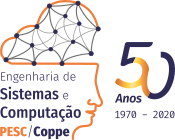About PESC
Since its foundation in 1970, its pioneering spirit has characterized the Systems Engineering and Computer Science Program (PESC). In it were developed the first national parallel computer, the first national relational database, an on-demand video system used at the Open University of Brazil, the first Brazilian patent granted to a Computer researcher, the first World Wide Web site in Brazil, a Prolog interpreter used worldwide and several other relevant projects for both the scientific community and society in general.
PESC is one of the 13 programs that are part of the Alberto Luiz Coimbra Institute for Graduate Studies and Engineering Research (COPPE). Therefore, it holds a privileged position in Computing's national research framework due to being inserted into a robust academic unit. COPPE brings together several programs of levels six and seven at CAPES from different areas of Engineering.
Our history demonstrates a strong alignment with national science and technology policies and leadership to search for new paths to computing problems. For example, in the 1970s, PESC participated intensively in internal training and rapid absorption of technologies from abroad. It hired foreign researchers and graduated masters and doctors who became the seed of many other postgraduate courses.
In the 1980s, PESC sought to consolidate itself by establishing lines of research that represent the backbone of Computing, assembling groups of researchers in each line to cover research in the areas broadly: Computer Architecture and Operating Systems, Databases, Optimization, Software Engineering, Computer Graphics, Artificial Intelligence, and Informatics and Society.
In the 90s, already twenty years old, PESC consolidated itself as a respected computer science department. It continued to form graduated people for other courses in the country. Therefore, being responsible for the nucleation of researchers in important universities and research centers in the country and almost all Latin American countries. New areas of research also started to be contemplated: Algorithms and Combinatorics, and Computer Networks. This decade also saw the maturation of the PESC's objectives towards increasing the quality of production crystallized.
In the first decade of the 21st century, PESC became the first level seven graduation program in Computer Science at CAPES. To this end, it developed a detailed productivity analysis and has constantly proposed policies to encourage students. Besides, it got concerned with providing a work environment that induces scientific production.
At 50 years old, PESC presents itself as a challenge to be recognized as the best graduate program in Latin America, is also internationally recognized among the best programs in the world. To this end, our immediate goals involve challenges such as further increasing the number of CNPq research professors, actively participating in the community, inviting their professors to accept prominent positions in committees and organizations related to Computing in Brazil and the world, and establishing solid international collaborations. And continue training new teachers and computer courses in the country.
The vision of the Systems Engineering and Computer Science Program is to be recognized as the best graduating program in Computer Science in Latin America and have its name recognized internationally as one of the best in the world.
Focusing on this vision, the quality search has guided all our work since 1970, through ongoing discussions at the Program Board on the PESC's role in Brazil and worldwide. In addition, PESC adopts an internal evaluation process for a long time. Such a standard process at COPPE allows evaluating PESC's productivity and quality. It supports its comparison with the 13 other graduate programs of COPPE, nine of them among levels six and seven of CAPES. Our professors constantly seek to meet the high internal standards of publication and the external measures of quality, especially those established by CAPES and CNPq. As a result, many of our professors are CNPq researchers or produced at an equivalent level. Several having been awarded scholarships from FAPERJ (Scientist of Our State and Young Scientist of Our State) and with awards or projects at an international level. It is directly reflected in the latest evaluation results. We were again rated grade seven by CAPES in the last three-year assessment, and we have been at PROEX since the beginning. We can also analyze the reflex of this search for quality in the personal evaluations of our teachers.
Of the 41 permanent professors on the board, 23 have a CNPq research grant. Of these, five have grade 1A (the highest rate in the country for researchers 1A), eight between 1B and 1D, and ten grade 2. In addition, eight of our professors receive the Scientist of Our State grant and two of the Young Scientist of Our State grant, provided by FAPERJ to high-productivity researchers at the state level. Add to this the fact that 16 professors have already done post-doctoral studies abroad with a CAPES scholarship. Regarding awards and distinctions, we have four professors awarded the Order of Scientific Merit, the Álvaro Alberto Award for Science and Technology, in addition to full members of the Brazilian Academy of Sciences.
Interdisciplinary and multi-institutional groups dedicated to the study of Computational Biology, Data Mining, Medical Informatics, Parallel Computing, and Telecommunications were created to keep the program always following and contributing to the trends of world research. Among these lines and groups, several research themes are developed, which are constantly being renewed with the advancement of Computing. In recent years, new topics have emerged, such as, among others: Treatment of Information Overload, Computer-Assisted Cooperative Work, Experimental Software Engineering, Modeling of Brain Functions, Complex Networks, Artificial Life, Relational Statistical Learning, Protocols for Multimedia and Video Networks on Demand, Scientific Workflow, Bioinformatics, Use of Optimization in Public Health Problems (Dengue), P2P Systems, Communication Protocols oriented to Interests, Social Networks, Wireless Sensor Networks, Virtualization of WEB Services - Cloud Computing, and Games Computer. The prediction is that new topics will continue to emerge as Computing progresses.
These and other new themes characterize the main challenges of PESC. They are concerned with maintaining the PESC pioneering position in the latest research areas where computer science is present, as a foundation or instrument, in a globalized world with unpredictable dynamics.



